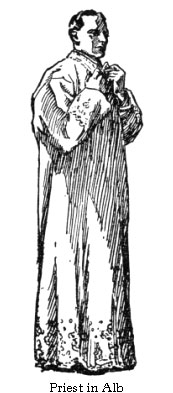While it is no longer the practice for all priests to offer prayers while vesting for Mass, many do offer these "vesting prayers." The prayers are a good occasion for them to be enriched with a profound humility and willing availability to act in the very Person of Christ at the Holy Sacrifice. In this series, we look at each vesting prayer and their corresponding vestment, as an intimate insight into the spiritual lives of priests at their most vulnerable moment every day, helping all the rest of us also to understand just who we are before God and neighbor.
PRAYER 3 – "Ad albam" ("Prayer used for the alb")
"Dealba me, Domine, et munda cor meum; ut, in Sanguine Agni dealbatus, gaudiis perfruar sempiternis." ("Brighten me, O Lord, and cleanse my heart, that being made resplendent in the Blood of the Lamb, I may thoroughly rejoice in eternal joy.")
The body-length white garment which a priest wears for Mass is called an alb. The word comes from the Latin "albus," which refers to a resplendent brilliance. We recall the transfiguration of Jesus on Mount Tabor, when His face became as bright as the sun and His clothing as white as light. Mind you, this was also when He spoke with Elijah and Moses about the dark time to come on Mount Calvary, the exodus that He was to accomplish in Jerusalem (see Lk 9:31), the very completion of the Sacrifice of the Last Supper: His body being handed over and His blood being poured out.
The alb is among the priestly garments of old, with which Aaron and his sons were clothed for their service in the great liturgy mandated by God Most High (see Ex 40:12-15). But Jesus belongs to the House of David, and He is in the priestly line of Melchizedek (see Hb 5:6), a priest after the heart of God Most High (see 1 Sm 2:35). The irony here is intense. The priest today wears an alb of the priestly order to which Jesus did not belong, but by which He suffered: the chief priests paid Judas to betray Jesus, with Caiaphas proclaiming the "prophetic" expedience that it is better that one man die than that a whole nation should perish; it is they who mocked Jesus while he forgave them from the cross (see Mk 10:33-34; Lk 23:34-35).
Though ceremonial uncleanness of the priests and their garments – due to the sin offering and the exodus of the scapegoat – was symbolically washed away with water (e.g. Lv 16), it was the blood of a ram which would consecrate the priests and the liturgical garments (see Ex 29:19-21). It was the blood of a goat with which the most famous garment of Joseph was drenched by the other sons of Jacob so as to fake Joseph's death, making him their scapegoat (see Gn 37:31), for they forgot that their great grandfather Abraham had a ram sacrificed in place of their grandfather Isaac (see Gn 22:8.13). So much sin and betrayal using goats, but so great the promise of redemption using rams! The mere washing with water of the priests and their garments would have to give way to being washed by the blood of the Lamb of God who would take away the sin of the world (see Jn 1:29).
In the great book of the divine liturgy in heaven and on earth, the Apocalypse, we read of "a great multitude, which no one could count from every nation, race, people, and tongue, who always stand before the throne and before the Lamb, wearing white robes" (Ap 7:9). One of the priests explains to John that those wearing the white robes "are the ones who have survived the time of intense tribulation; they have washed their robes and made them white in the blood of the Lamb" (Ap 7:14). These are the ones who loudly cry out: "Salvation comes from our God, who is seated on the throne, and from the Lamb" (Ap 7:10).
The blood of that Lamb of God began to flow from Him like great drops of sweat during His intense tribulation in His agony in the Garden of Gethsemane at the moment of His betrayal by Judas. Betrayal only comes from friends, who dip their bread in the dish with Jesus as did Judas. By our sins, all of us priests have betrayed Jesus. Wearing the alb is an occasion to be humble and contrite of heart. Being vested in the alb is also about being willing to be betrayed with Jesus, even by one's friends. It is an invitation to know intimacy of friendship with Jesus such that we, with His grace, would call a betrayer "friend" as Jesus called Judas at the very moment of that deadly kiss (see Mt 26:49-50).
What a great preparation it is for us priests to recite this little prayer while vesting for Mass. We have the hope that our darkened souls will be brightened, that our filthy hearts will be cleansed, that in the very sacrifice of the Blood of the Lamb we ourselves are made resplendent, and that, finally, we will thoroughly rejoice in eternal joy. The intense tribulation we have in dying to ourselves so as to do only the will of "Abba, Father" (Mk 14:36), brings us to rejoice in the peace provided by the goodness and kindness – and patience – of Jesus even for us priests.
Father George David Byers is administrator of Holy Redeemer Church in Andrews.




